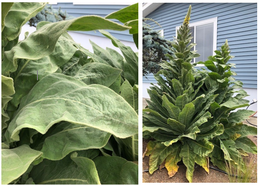 Mullein
Mullein I think one of the best herbs for dry and smoky conditions is Mullein leaf (Verbascum thapsus). Mullein leaf loves the lungs and has demulcent/mucilaginous qualities that help moisten and soothe irritated tissue. It is also a gentle expectorant that can help move mucus up and out of the lungs. Drink it as a tea but make sure that you strain it well (coffee filter or cotton cloth works well), as the leaves contain little hairs that can be very irritating. You can mix it with other moistening herbs like Marshmallow root (Althaea officinalis) or Slippery Elm bark (Ulmus fulva) to make a cooling, soothing tea to help ease irritated tissues in the throat and bronchials. Make this tea as a cold infusion (see instructions below) to get all of that slippery, gooey goodness from these plants. Also, make sure to use Slippery Elm bark that is grown and harvested in a sustainable manner, as it is one of our more endangered plants.
Here are some other helpful and supportive herbs that can be taken as teas or extracts/tinctures. All of the herbs discussed in this article are safe for most individuals, but it is always good to check them for possible allergies and contraindications with medications you take. Notice that they are not just respiratory herbs – they also support other body systems that can be adversely affected when our bodies and minds are stressed from wildfire conditions.
- Thyme (Thymus vulgaris)– a relaxing expectorant that can help loosen mucus and move it up and out- but relaxes the bronchials too (helps reduce coughs and spasms).
- Yerba Santa (Eriodictyon californicum) – acts as a bronchodilator and opens airways, possibly helping with asthmatic reactions. This is a very drying plant though, so make sure that it is used in smaller amounts and mixed with the moistening herbs to provide some balance.
- Tulsi/Holy Basil (Ocimum sanctum or tenuiflorum)–a relaxing expectorant, but also relaxes the nervous system and is an adaptogen (helps the body adapt to physical, environmental, and mental stress).
- Rhodiola (Rhodiola rosea) – one of our premier primary adaptogens that has an affinity for the lungs. It can be used to not only help the body adapt to stresses, but it can also improve oxygen uptake. Like Yerba Santa, it can be drying so use with more moistening herbs.
- Dandelion leaf (Taraxacum officinale) or Burdock root (Arctium lappa) – both of these herbs are alterative, meaning that support clearing of waste and toxins from our bodies. These herbs help clear the lymph and blood using the liver and urinary system to eliminate toxins, of which inhaled smoke is one.
- Scullcap (Scutellaria lateriflora) – as a relaxing nervine, it supports healthy functioning of the nervous system without making you sleepy.

Herbal steams can also be helpful, as they are a great way to moisten and clean dry eyes, sinus passages and lungs.
For the eyes, warm steam by itself is perfect. For the lungs and sinuses, you can add soothing, antimicrobial essential oils or put fresh plant material into boiling water and inhale the infused steam. Essential oils or plants that can be used are Lavender, Eucalyptus (my favorite), Thyme, and Rosemary. Be cautious with hot steam though – keep your face far enough away from the hot water/steam so as not to burn it.
Other Protective Measures
Other protective measures, used in conjunction with herbs, can help keep you and your family comfortable.
- Stay indoors with windows and doors closed when conditions are intense. Identify any places where you might have air leaks (under doors, windows, etc) and do your best to eliminate them (towel against the front door threshold, etc).
- Wear a mask. N95 masks are the standard for these smoky conditions, but they may not be available due to the Covid-19 pandemic. Although not as good as a N95 mask, use your pandemic mask (cloth, medical, etc) whenever you are experiencing poor air quality. Something is better than nothing. Comsumerlab.com has some good information on the types of masks that are good for the pandemic and are helpful for wildfire conditions too: https://www.consumerlab.com/answers/how-to-make-covid-19-mask-at-home-as-effective-as-n95/make-a-mask/ You can also add a filter to your mask – I have been using these fragrance free, dry baby wipes and they work fairly well: https://athome.medline.com/en/medline-ultrasoft-disposable-dry-cleansing-cloths-50ct-ultrasft1013z
- Set air conditioning systems to recirculate inside air when possible – not all systems do this - to avoid outside air from coming into your residence or place of work. If your car comes equipmed with an air recirculation feature, use it when driving. Change furnace/air conditioning filters.
- Use air purifiers/filtration systems in your home. Remember to change the filters when they are dirty.
- Minimize physical exertion, especially outdoors.
- Use saline solutions – nasal spray to moisten and clean nasal passages, and eye drops to soothe and clean irritated eyes.
Disclaimers
It is the policy of The Herb Society of America not to advise or recommend herbs for medicinal or health use. This information is intended for educational purposes only and should not be considered as a recommendation or an endorsement of any particular medical or health treatment.
Any and all information available in this article is for educational purposes only. I am not a doctor and this information should not be considered medical advice. It is not meant to diagnose or treat disease, and it does not replace the relationship that you have with your physicians or their treatment protocols and advice. Always research the use of herbs and supplements prior to taking them for possible allergies or contraindications with medications you take.


 RSS Feed
RSS Feed